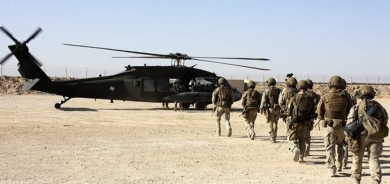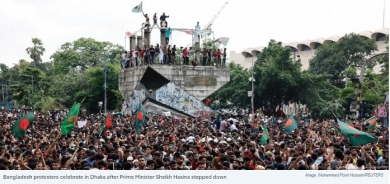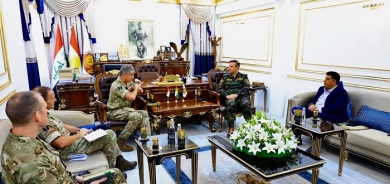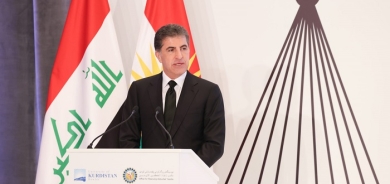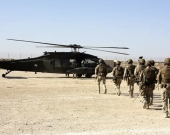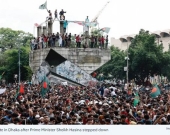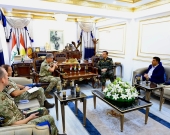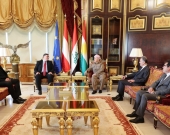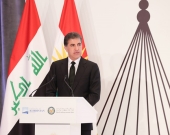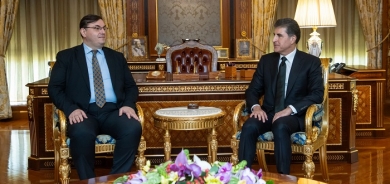Uncertainty and anger at Kurdish Yezidi refugee camp
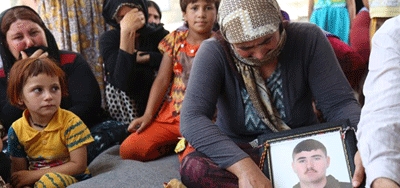
Twelve-year-old Khaida Khalid lies prone in a corner of the concrete hut he shares with 15 relatives in Khanke camp in Iraqi Kurdistan. He stares into nothingness as flies land in his open mouth and wet, unblinking eyes.
Khalid has been paralyzed since birth. He cannot communicate and rarely sleeps, says his father, Khalid Semo, 32.
Ragged clothes cling to Khalid’s contorted frame. His feet are dwarfed, his fingers permanently twist in toward his arms. He peers blankly at the many faces surrounding him as an old woman shoos away the insects.
Tragic scenes such as Khalid’s are common in Khanke, a camp near Duhok where thousands of displaced Kurdish Yezidis live with few necessities in squalor and hopelessness. Khanke is underfunded and overcrowded, like most camps in Iraq and the Kurdistan region, and the grim conditions make life hardest for those who need help the most.
More than 16,000 Yezidis live in Khanke’s 3,000 or so shelters and tents. Each family tells of a different time. Many drift back to the day the Islamic State, or ISIS, attacked and changed their lives forever.
It was one year ago that thousands of Yezidis were slaughtered in Shingal. Thousands of women and children were kidnapped. Many were enslaved by the terrorists, raped and abused.
Those who survived ended up in camps such as Khanke. The terror the Yezidis felt then has slowly transformed into seething anger, at the terrorists, the situation in the camps, and those who promised to protect them.
On the other side of Khanke, 17-year-old Farhad Ahmed has lost the fight for his life.
When the ISIS attacked Shingal, Ahmed’s family fled their nearby village, narrowly avoiding the Shingal Massacre, as the genocide has come to be called.
Ahmed, 17, survived the onslaught. He, his mother, his three brothers and his three sisters fled to Khanke. On Saturday – two days before the one-year mark of the massacre – Ahmed died of bone cancer.
“The funeral would last for seven days in a normal situation, but it was reduced to three because of the camp conditions and the heat,” says his brother, Salam, on the final day of the funeral in Khanke camp.
A searing August sun beats down on Salam’s face, drawing beads of sweat. The 21-year-old’s red hair and freckled complexion contrast sharply with his dark-haired brother.
“It’s very difficult here,” he says. “There’s sometimes no electricity or water.”
Salam ducks under a tent pieced together by blankets and plastic sheets to join a group of men sitting in a circle.
In Yezidi culture, he explains, it is customary for friends and family of the deceased to gather together for days of grieving. The entire village knew Farhad, he said.
A few yards away, Salam’s mother sits in mourning surrounded by dozens of women inside a windowless concrete shelter. She emerges from the shelter clutching pictures of Farhad.
She is crying too hard to speak. She is in too much pain to talk about her son, Salam says.
The two pictures in her arms are testaments to how strong Farhad was.
The first is a headshot of a boy with a big smile and the trace of a youthful mustache. The second is more revealing: Farhad after his hand was amputated.
“We looked for four years to find a cure for his cancer,” Salam says. “Doctors in Hawler cut one of his hands off, but his disease still spread. It was curable if he would have gone to Turkey.“We couldn’t find the money to cure it.”
Bassam Sulieman, 22, was studying for an exam at the University of Mosul, when ISIS took the city, Iraq’s second largest.
He fled to his home in Shingal, where two months later the extremist hell-storm arrived. Sulieman and 13 of his family members piled into a car and fled to Duhok.
“Before the ISIS attack, we had trust and confidence in the Peshmerga,” Sulieman says. “Then suddenly they left. I don’t know why.”
“The Peshmerga abandoned us,” adds his brother, Sami. “I saw it with my own eyes.”
He spends a lot of his time thinking about home, he says, and he dreams of going back.
“I miss everything,” he says looking down at the concrete floor he sleeps on now. “My friends, my family. Everything.”
His brother dreams of leaving his homeland.
“I don’t want to go back home,” Bassam says. “I don’t want to live in Iraq. Everywhere is not good. They kill in the name of religion. They are trying to kill us because we aren’t Muslim.”
The brothers explain the impossibility of planning for a future forged on the life they live now. “No jobs, no nothing,” Sami says, lighting a cigarette. “ Our destiny is unknown.”
Uncertainty and apprehension are tangible all across Khanke, nowhere more than back at Khalid’s shelter. His family does all it can to comfort him.
“There is no money for medicine,” says the his father. “We sometimes get painkillers to make him fall asleep, but we don’t have money for them.”
His father explains how small families usually have enough food and water, but big families like his struggle to make it.
“We are all under one tent,” he says of his family. “All 15 of us.”
The flies return and the woman makes the same practiced motion with her rag. Khaida gazes on without moving or making a sound.
Rudaw


